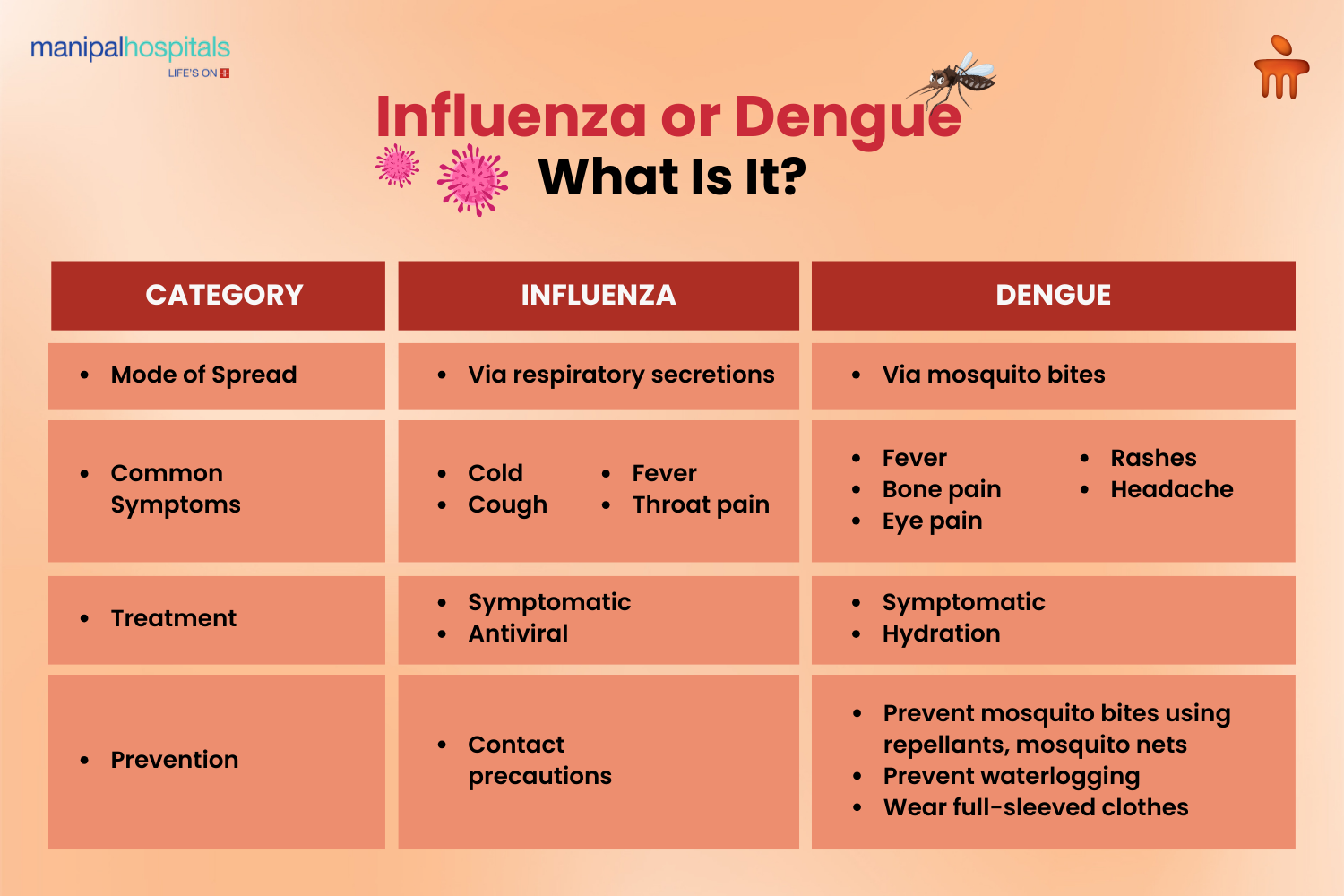
As winter approaches, many find themselves longing for the warmth of summer. However, many of us also battle seasonal cold or flu symptoms in colder months. Thus, knowing the difference between seasonal colds and dengue fever is important in regions where these illnesses are common. Both seasonal colds and coughs, and dengue fever are viral infections and exhibit similar signs and symptoms; however, they differ significantly in terms of their causes and management. In this blog, let us know their key differences and how to get rid of seasonal flu and dengue fever.
Synopsis
Flu: Seasonal Colds and Cough
Seasonal flu is usually caused by Influenza viruses, which are known to cause acute respiratory illnesses. They can lead to morbidity and mortality, but that mainly depends on a patient’s immune status. The mode of spread is direct person-to-person through saliva and nasal secretions and from aerosols or direct contact with objects that contain the virus. Seasonal colds and coughs spread very quickly – patients can catch the disease within 1-4 days of exposure.
Symptoms of seasonal colds and coughs include:
-
Coryza: A running or blocked nose
-
Cough: Dry or productive, along with sore throat
-
Fever: Mild to moderate, accompanied by chills and sweating
-
Body Aches: Muscle pain is common but not very severe
-
Fatigue: Mild tiredness
Seasonal Cold and Cough Treatment
The treatment of seasonal influenza is predominantly symptomatic (with seasonal cough and cold medicines), although antivirals are also offered if the patient is diagnosed early.
What Is Dengue Fever?
Dengue fever, a more severe viral hemorrhagic fever that affects human beings, is caused by a virus known as the dengue virus which belongs to the family flaviviruses. Dengue is transmitted through the bite of mosquitoes, primarily the Aedes aegypti species. Symptoms have typical onset 8-12 days after the mosquito bite.
Below are dengue fever symptoms:
-
High-grade Fever: Usually abrupt onset, often exceeds 102°F
-
Severe Myalgia: Intense muscle and joint pain
-
Headaches: Are often severe, behind eyes
-
Rashes May occur several days after the fever starts
Dengue Treatment
Dengue must be managed meticulously because, if there is a delay or the disease is left untreated, complications such as shock or bleeding manifestations may occur in extreme cases. The initial dengue treatment focuses on alleviating the signs and symptoms while ensuring proper hydration.
Similarities and Differences Between Seasonal Flu and Dengue

Similarities
-
Both seasonal flu and dengue fever are viral infections and might show symptoms of high-grade fever with muscle aches.
-
The overlapping of initial symptoms often makes people susceptible to the wrong diagnosis in these cases.
Differences
The key difference between seasonal flu and dengue fever is their mode of transmission. Influenza viruses spread through respiratory droplets whereas dengue fever is transmitted by mosquito bites. Seasonal colds and cough symptoms are often mild in nature and thus, can be managed at home with symptomatic treatment and antiviral medication. Dengue fever manifests in high fever and severe headache, accompanied by muscle and joint pain. Thus, dengue treatment mainly involves careful monitoring and hydration therapy. Dengue fever can be life-threatening without close monitoring for potential complications. It is important to seek a healthcare provider if the symptoms worsen or you suspect dengue fever, especially in endemic areas.
Prevention Strategies
Seasonal Flu Prevention
-
Vaccination: Flu vaccines should be taken annually to prevent seasonal flu (colds and coughs).
-
Hygiene Practice: Wash your hands regularly, for 20 seconds. Use sanitiser when hand washing is not possible.
-
Avoid Close Contact: Avoid close contact with people who show symptoms of flu.
-
Respiratory Hygiene: Cough or sneeze using a tissue, or if tissue is unavailable, use your elbow and dispose of used masks/tissues properly.
-
Healthy Lifestyle: A well-balanced diet, proper exercise, adequate sleep, and reduced stress increase immunity and help prevent seasonal colds and coughs.
Dengue Fever Prevention
-
Control the Mosquitoes: Discard objects holding stagnant water, which Aedes breeds, for instance, flower pots, buckets, and gutters.
-
Insect Repellents: Put on insect repellent that contains any of the following chemicals: DEET, picaridin, or oil of lemon eucalyptus on exposed parts of the body.
-
Protective Clothing: Drinking plenty of water and having long-sleeved shirts, long trousers, and socks, especially at the cooler periods of the day, will help too.
-
Mosquito Nets: Use insecticide-coated bed nets if you are from or living in a dengue-infected area.
-
Community Awareness: Spreading awareness helps clear all the areas that will potentially become breeding grounds. Airing programs on how to prevent dengue is also an effective method.
Conclusion
Both seasonal colds and dengue fever share some symptoms, which is why it is very important to understand the differences in their signs to receive the appropriate treatment and management. If you exhibit symptoms that could align with either condition, consult our top infectious disease doctor in Bangalore for an accurate diagnosis and appropriate treatment.
FAQ's
The most common signs of dengue are acute, high-spiking fever, severe headache, myalgia, arthralgia, nausea and vomiting, and rash.
To get rid of seasonal influenza, you need to act on treating symptoms, for example: take paracetamol for fever. The body requires rest to recover during seasonal viral flu. Additionally, follow a healthy diet to boost immunity. If symptoms worsen over time, consult a doctor immediately.
The recommended diet to treat dengue fever will include vitamin C and iron foods, several glasses of coconut water, other forms of fluids, and proteins.



















 4 Min Read
4 Min Read














